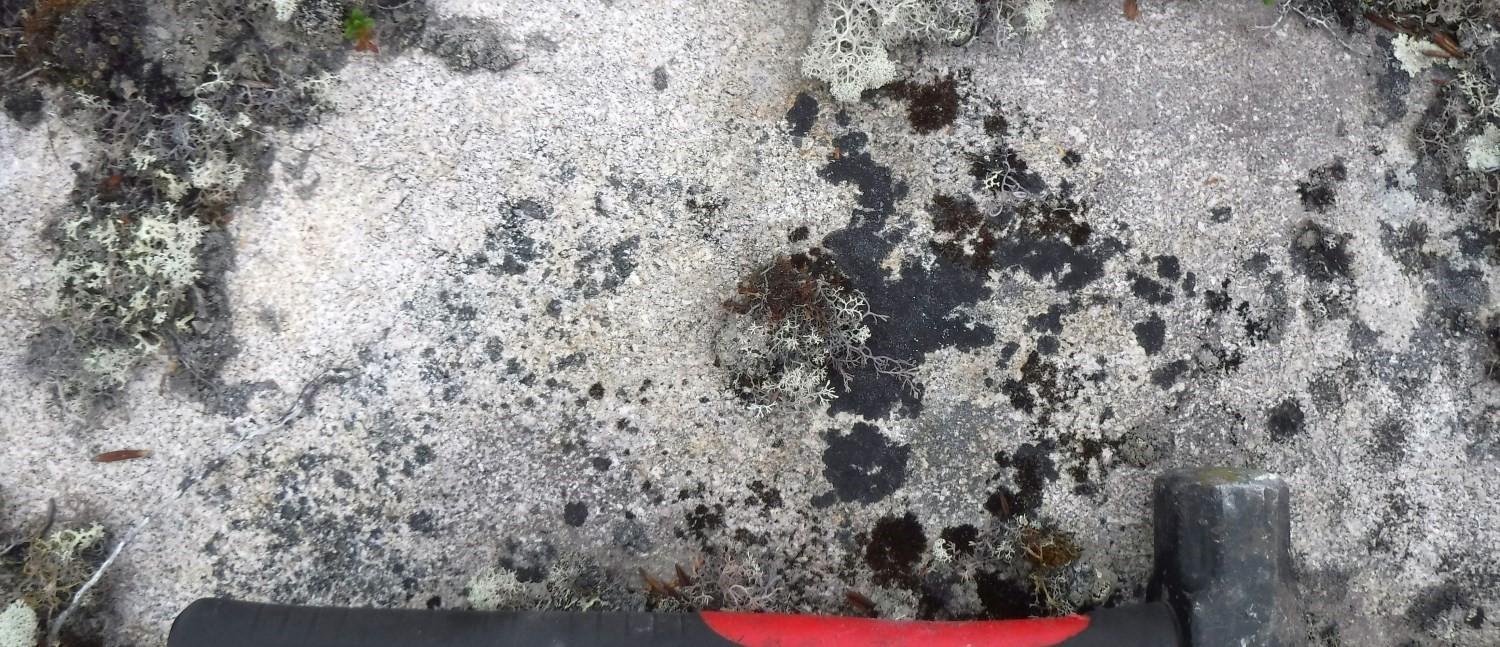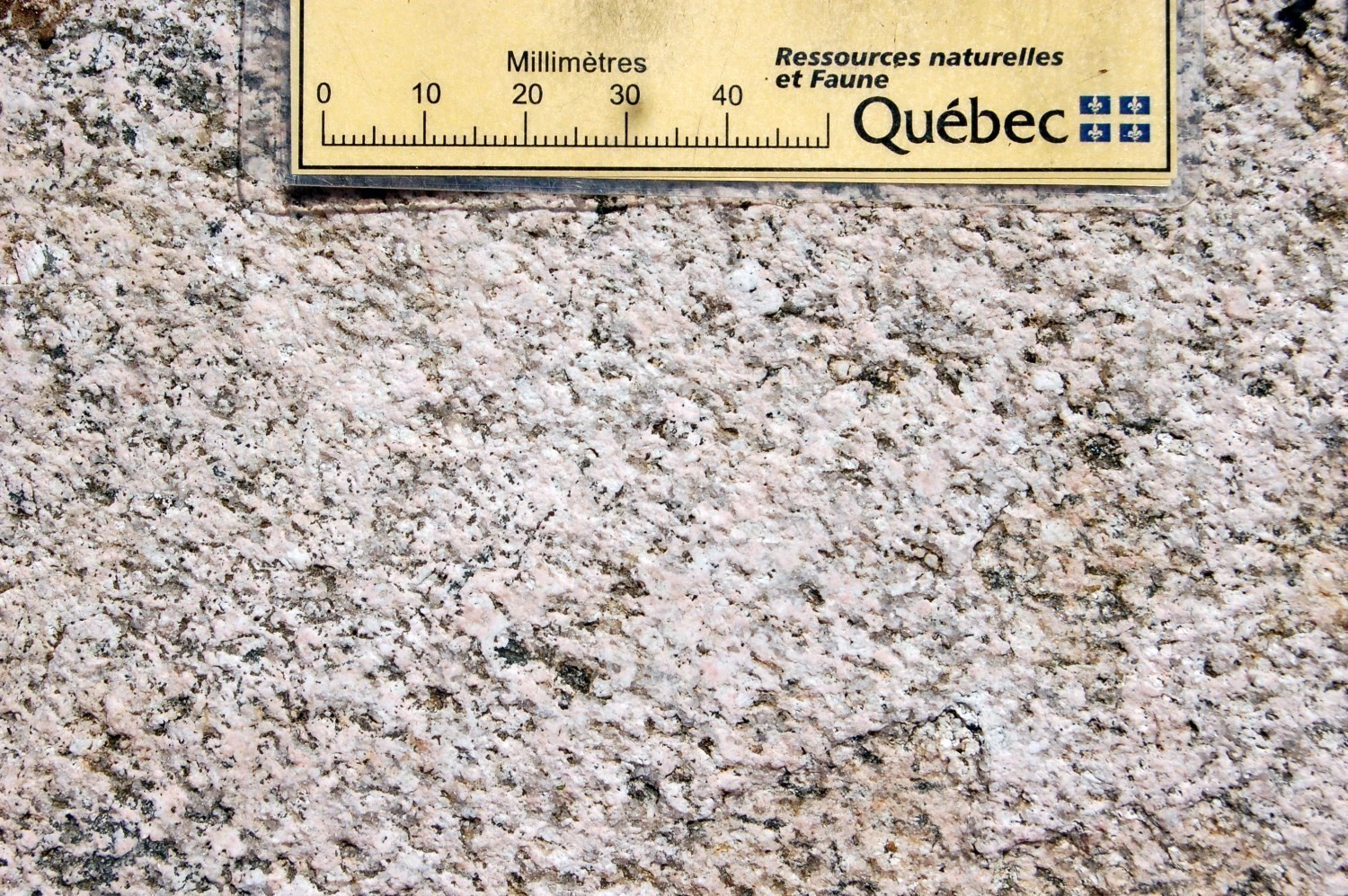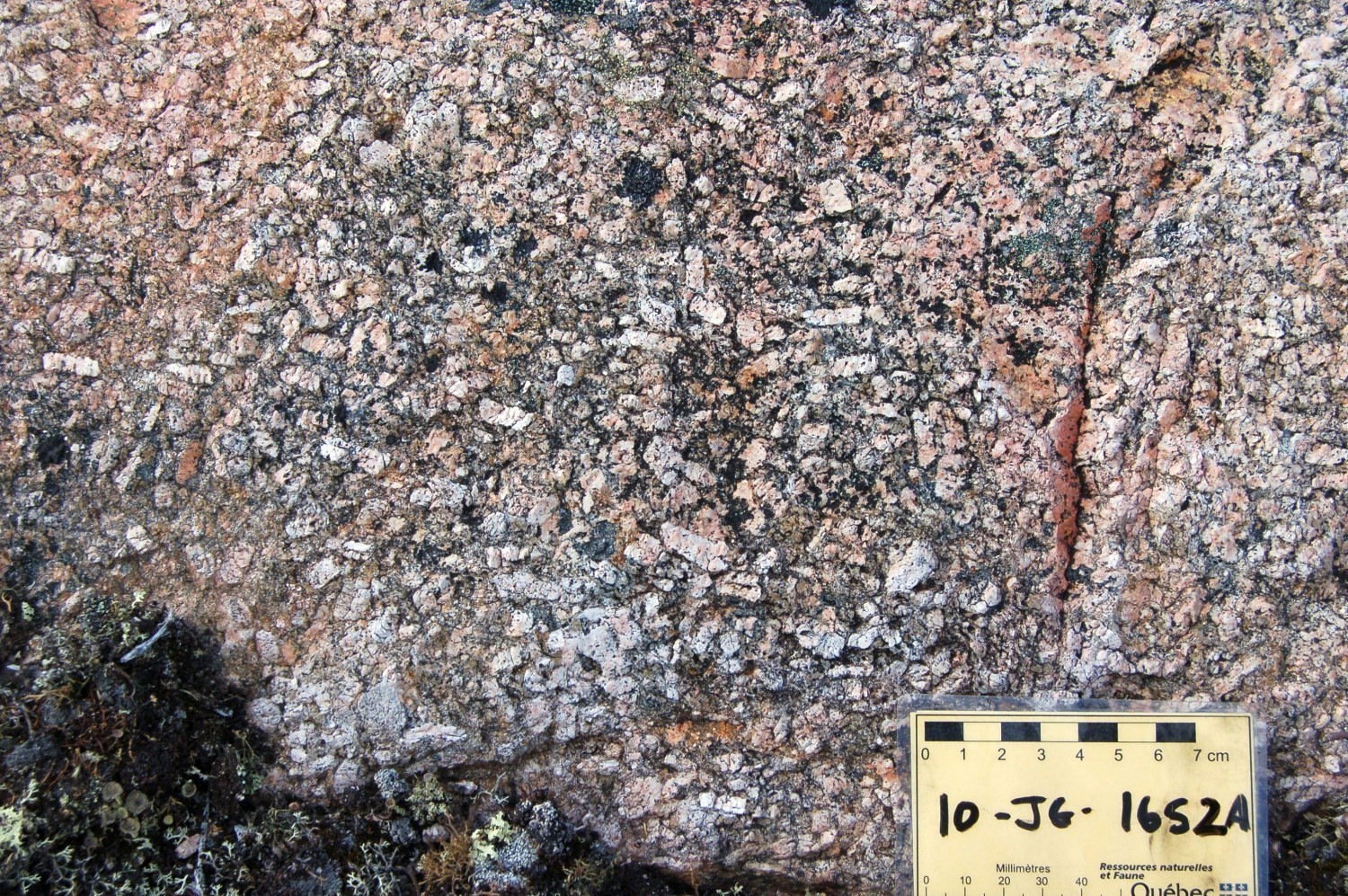
| Author: | Van der Leeden, 1995 |
| Age: | Paleoproterozoic |
| Stratotype: | None |
| Type area: | Leif Lake area (NTS sheets 23P09 and 23P10) |
| Geological province: | Churchill Province |
| Geological subdivision: | Mistinibi-Raude Lithotectonic Domain |
| Lithology: | Granitoids |
| Category: | Lithodemic |
| Rank: | Suite |
| Status: | Formal |
| Use: | Active |
None
Background
The term « Dumans Granite » was first used by van der Leeden (1995) to describe an intrusion located east of the Rivière George Shear Zone (ZCrge). Owen (1989, 1991) also described an informal subunit (F1c) composed of similar rocks, which included the Raude Lake, South Goélands Lake and North Goélands Lake plutons, among others. Hammouche et al. (2012) also associated similar intrusions to the lithological unit I1a in the southern extension of the « South Goélands Lake Pluton ». These informal terms were all dropped and the unit was renamed “Dumans Suite” by Charette et al. (2019), as part of the Southeastern Churchill Province regional synthesis (Lafrance et al., 2018).
Description
The Dumans Suite consists of a leucocratic granite unit (pPdmn1), and a monzogranite and granodiorite unit (pPdmn2). These two units are in sharp contact, but the crosscutting relationship has not been observed since these lithologies are generally massive or minimally deformed. They are intruded by decimetric coarse-grained to pegmatitic granite dykes that can account for 1 to 20% of outcrops. They also contain 5 to 30% metric to decametric subrounded enclaves of foliated to gneissic diorite of the Advance Complex. Mylonitic deformation zones are observed locally in the Dumans Suite. In that case, the rock contains quartz lenticular bands and microcline porphyroclasts.
Dumans Suite 1 (pPdmn1): Leucocratic Granite
Unit pPdmn1 consists of light grey, homogeneous, leucocratic and fine to medium-grained granite. It is locally pinkish in areas affected by strong hematitization. Euhedral magnetite crystals (1-3 mm) are scattered heterogeneously in granite. Thin sections exhibit an intrusive appearance with some grain reduction and many myrmekites and perthites. Silicate minerals have a mosaic texture. Quartz (30%) shows undulatory extinction, and brown to green biotite (<5%) is the main ferromagnesian mineral. Hornblende was observed in some samples. Accessory minerals are abundant and usually form large subhedral crystals next to biotite. They consist of epidote, muscovite, allanite, sphene, opaque minerals, zircon, and more locally garnet. Biotite is locally chloritized and plagioclase is slightly sericitized. Locally, unit pPdmn1 includes fine-grained grey and light pink speckled quartz monzonite. This rock has the same mineralogy and appearance in thin sections as granite, but with a greater biotite content (15-20%).
Dumans Suite 2 (pPdmn2): Monzogranite and Granodiorite
Unit pPdmn2 consists of homogeneous medium to coarse-grained monzogranite and granodiorite. Microcline crystals are euhedral and some are slightly coarser than the matrix (1-3 cm), locally forming a porphyraceous texture. The rock is pinkish grey in fresh exposure and grey in altered patina. It contains 5 to 15% ferromagnesian minerals, mainly biotite, sphene, epidote, opaque minerals, as well as a small amount of hornblende. Biotite is greenish and contains many zircon inclusions. Allanite, muscovite, chlorite and apatite are accessory phases. Quartz (20-30%) forms interstitial polycrystalline zones and plagioclase is saussuritized. Perthitic and myrmekitic textures are abundant.
Thickness and Distribution
The Dumans Suite covers an area of 506 km2 in the west-central part of the Mistinibi-Raude Lithotectonic Domain (sheets 23P01 and 23P07 to 23P10), east of the ZCrge. Unit pPdmn1 (465 km2) is the dominant unit while unit pPdmn2 (41 km2) is more restricted.
Dating
A preliminary crystallization age of ~1808 Ma was obtained in a leucocratic granite sample (outcrop 2016-BC-1155).
| Unit | Sample Number | Isotopic System | Mineral | Crystallization Age (Ma) | (+) | (-) | Inherited Age (Ma) | (+) | (-) | Reference(s) |
| pPdmn1 |
2016-BC-1155A |
U-Pb | Zircon | 1808 | 17 | 17 | 2312 | 28 | 28 | David, personal communication, 2019 |
Stratigraphic Relationship(s)
The Dumans Suite intrudes as decimetric sills into gneiss of the Advance Complex and into paragneiss and diatexites of the Mistinibi Complex. It also contains enclaves of lithologies associated with these units.
Paleontology
Does not apply.
References
| Author(s) | Title | Year of Publication | Hyperlink (EXAMINE or Other) |
|---|---|---|---|
| HAMMOUCHE, H. – LEGOUIX, C. – GOUTIER, J. – DION, C. | Géologie de la région du lac Zeni. Ministère des Ressources naturelles, Québec; RG 2012-02, 35 pages, 1 plan. | 2012 | RG 2012-02 |
| LAFRANCE, I. – CHARETTE, B. – VANIER, M.-A. | Southeastern Churchill Province, Nunavik, Quebec, Canada: Geological Synthesis. Ministère de l’Énergie et des Ressources naturelles, Québec. Preliminary BG. | 2018 | Bulletin géologiQUE |
| CHARETTE, B. – LAFRANCE, I. – VANIER, M.-A. – GODET, A. | Mistinibi-Raude Domain, Southeastern Churchill Province, Nunavik, Quebec, Canada: Geological Synthesis. Ministère de l’Énergie et des Ressources naturelles, Québec. BG 2019-07. | 2019 | BG 2019-07 |
| OWEN, J. V. | Géologie de la région du lac Raude, Territoire du Nouveau-Québec. Ministère des Ressources naturelles, Québec; ET 88-10, 73 pages, 5 plans. | 1991 | ET 88-10 |
| OWEN, J. V. | Géologie de la région du lac Leif, Territoire du Nouveau-Québec. Ministère des Ressources naturelles, Québec; ET 87-18, 54 pages, 3 plans. | 1989 | ET 87-18 |
| VAN DER LEEDEN, J. | Géologie de la région du lac Mistinibi, Territoire du Nouveau-Québec. Ministère des Ressources naturelles, Québec; MB 95-45, 112 pages, 3 plans. | 1995 | MB 95-45 |



